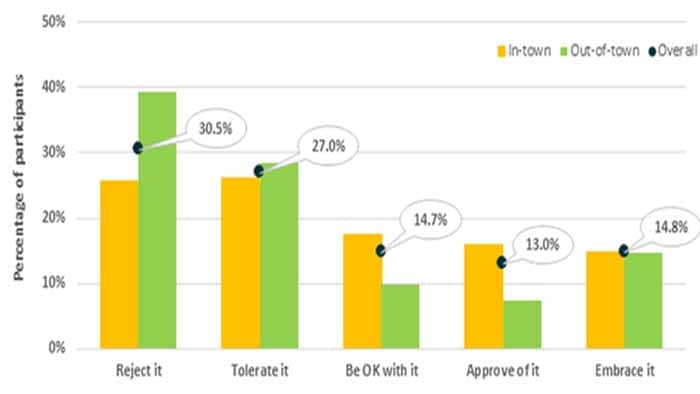As Australia’s premier science agency with extensive experience in land, water and onshore gas research, CSIRO is well-placed to inform communities impacted by coal seam gas (CSG), the general public, governments and CSG industry on the environmental, social and economic impacts of CSG development in Australia.
You’ve seen and heard those for and against the CSG industry yet there is also another perspective - the majority of residents that neither reject nor embrace CSG development.
Through CSIRO’s Gas Industry Social and Environmental Research Alliance (GISERA) our social scientists have conducted a survey of community wellbeing and attitudes to CSG in the Narrabri Shire, NSW, in March - April 2017.
Using a randomly selected and representative sample, the survey showed that attitudes toward CSG development varied widely in the Narrabri Shire. Specifically, 30% of residents ‘reject’; 27% ‘tolerate it’, 15% would be ‘ok with it’, 13% ‘approve of it’ and 15% ‘embrace it’. Also, people who lived in Narrabri and surrounds held more favourable views than those who lived in other sub-regions in the Shire.

There seems to be pressure from both sides of the fence to choose one side, and CSIRO’s research provides an opportunity for those who are in the middle, and don’t have strong views about CSG, to be identified and to have a voice.
CSIRO has conducted similar surveys in the Western Downs region of South East Queensland over the past four years and again there is a range in people’s attitudes, with fewer people rejecting gas (10% reject). Results also indicate that the communities’ wellbeing over these years hasn’t changed much.
One big and justifiable concern people have is the impact of CSG on groundwater quality and quantity. Will there be a drop in water levels in the Great Artesian Basin as a result of the proposed CSG development in Narrabri? Can high quality water in our aquifers be contaminated by low quality CSG water?
One of our research projects investigated the water quantity question using existing knowledge on water flow rates within the Great Artesian Basin and simulation models. Outcomes show that the expected value of maximum water loss from the main aquifer (Pilliga Sandstone) is about 85 megalitres per year, or about 0.3% of annual extraction limit set by the regulator.
Water connectivity refers to how well water can move through various rock layers under the surface. Some people think that an aquifer is an underground cave filled with water, which isn’t correct. There are many layers of rock underground. Some are called aquifers – they are porous and allow water to move through them easily, such as sandstone. Some are called aquitards - they are not porous and don’t allow water to move through or along them, such as granite.
The Pilliga Sandstone aquifer, within the Great Artesian Basin, is separated from the CSG-containing coal formations by thick layers of rock (aquitards) that impede water flow through them.
The connectivity between the Pilliga Sandstone aquifer and underlying coal formations is generally poor, this means the risk of cross contamination is low and the volume of water loss from the Pilliga Sandstone aquifer to the coal formations from CSG development will be low.
CSIRO will continue to conduct independent research on the social and environmental impacts of CSG. We make available our peer-reviewed research to everyone so they can make informed decisions. The role of science is to help all parties better understand the range of impacts associated with various development scenarios, and provide a common platform for policy makers, developers and communities to negotiate and make decisions.
Insight is Australia's leading forum for debate and powerful first-person stories offering a unique perspective on the way we live. Read more about Insight
Have a story or comment? Contact Us


